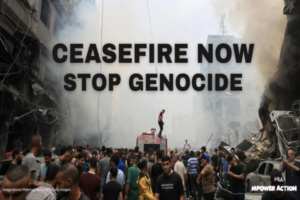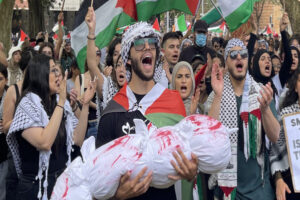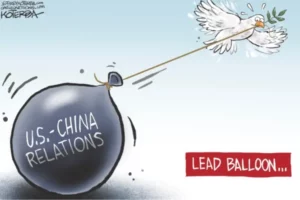
My cousin Alaa was right.
“Leaving our home – and all the joyful memories in it – is one of the saddest experiences of my life,” Alaa said.
Israel’s aggression toward Gaza involves both mass killing and expulsion.
An uncle of mine recalled how he woke up one morning to see Israeli leaflets warning people that they must evacuate.
“We were defiant,” my uncle said. “We refused to leave our homes. We said that we were not giving into the Israeli occupation. We decided that whatever our fate, we would stand firm. In any event, nowhere is safe.”
My uncle was right, too.
Israel has callously attacked people who have done what they have been instructed – moved southwards.
Israel has reduced homes to rubble all over Gaza, leaving dead bodies everywhere. Even ambulances trying to reach areas that have been bombarded have themselves come under Israeli fire.
Alaa, my cousin’s family left their home after an intense bombardment of the area where they live in Gaza City’s Beach refugee camp.
Although my uncle – Alaa’s father – had initially sounded a defiant note, he felt compelled to evacuate given the intensity of Israel’s bombardment.
“We witnessed another killing as we moved south,” said Alaa. “The journey was exhausting.”
Indelible mark
Israel displayed no regard for the elderly or people with disabilities.
“My grandmother is unable to walk,” Alaa said. “So we had to bring her wheelchair. When we approached a checkpoint manned by Israeli soldiers, we raised our arms, holding up white flags and our IDs.”
“We were afraid,” Alaa added. “We knew about the reputation of the soldiers and how they had treated other evacuees. The Israeli soldiers have detained a lot of men and confiscated their belongings. Nobody knows what will happen to the men.”
Compared to many others, Alaa’s family was “lucky.” They were allowed through the checkpoint.
But they still had a long journey before they reached the place where they took shelter.
The forcible displacement in Gaza during October and November 2023 recalls the Nakba, the 1948 ethnic cleansing of Palestine.
The Nakba – Arabic for catastrophe – left an indelible mark on the Palestinian people, shaping their collective memory.
For Palestinians, the Nakba is not relegated to the history books. It is an ongoing reality, intricately woven into the various facets of contemporary Palestinian life.
Most people in Gaza are either survivors of the Nakba or their descendants. They are now being uprooted again.
Gaza’s story is one of intergenerational displacement. When elderly people try to navigate their way through the current crisis, the echoes of the Nakba resonate everywhere.
The echoes can still be heard above the deafening sounds of Israel’s explosions.
Eman Alhaj Ali is a journalist and translator based in Gaza.



